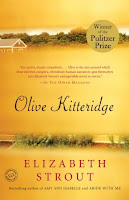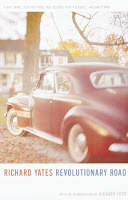 Before I review Ann Brashares first adult novel (she’s the author of the uber-lovely Sisterhood of the Traveling Pants series), I’m going to make a confession. This book made me cry. Big, crocodile tears that caused my RRHB to put his hand on my shoulder and ask if I was okay as I was reading in bed. I was sobbing. Sniffling, snorting, bawling. Except I’m not really sure why. For the most part, the novel itself was utterly predictable, the characters were a little one-dimensional, and the story never truly resonates like her previous series.
Before I review Ann Brashares first adult novel (she’s the author of the uber-lovely Sisterhood of the Traveling Pants series), I’m going to make a confession. This book made me cry. Big, crocodile tears that caused my RRHB to put his hand on my shoulder and ask if I was okay as I was reading in bed. I was sobbing. Sniffling, snorting, bawling. Except I’m not really sure why. For the most part, the novel itself was utterly predictable, the characters were a little one-dimensional, and the story never truly resonates like her previous series.
Two sisters, Alice and Riley, have spent their summers (for their entire lives) on a tiny island off the coast of New York. Fire Island might be where they spend the warm months but for Riley and Alice, like so many Canadian kids who grew up at cottages (like me), it’s where their whole world starts and ends. Their collective best friend Paul (he’s Riley’s age; Alice is younger) lives next door. He’s slightly troubled with a crazy mother, a pile of money from his rich grandparents, and a heart that seemingly always lands in the right place. So when Paul comes back to the island to spend the summer after he’s finished university, everything changes. And the relationship between the three of them will never be the same again when the cold weather rolls in.
But it’s not just growing up that changes their relationship, it’s tragedy. Unpredictable, yet honestly a little too twee, the plot feels too contrived to make a great impact on me as a reader. Even if Brashares can write emotion like few others, the novel doesn’t feel adult, it still feels on the cusp of YA. It has predictable situations that are written with deep feeling and characters who wear their hearts on their sleeves only after a little prodding. Alice and Riley, despite their differences, felt a little too much like characters, if that makes any sense. They’re too polar opposite, trying too hard to be “distinct,” and, in ways, just a little too perfect despite everything that happens to them. There’s everything and the kitchen sink in this novel, issue piled upon issue, so you feel a little like you’re watching a movie of the week.
It might seem like I’m being overly critical. Maybe I am. Yet, despite all of my criticisms, let me just say again, when it came to the tragic bits, I ended up with giant, salty tears falling down my sweet cheeks. Now that’s got to count for something.









